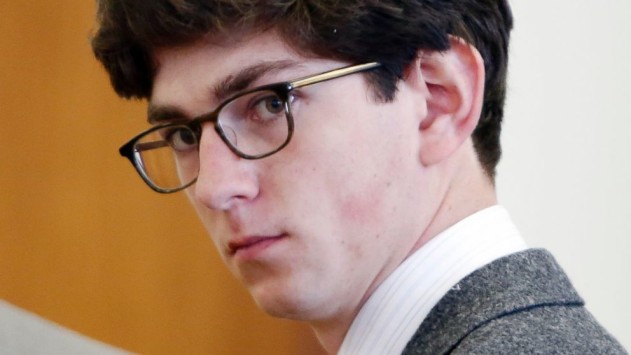Our justice system conducts the trial of Owen Labrie and other alleged attackers under the auspice of “innocent until proven guilty.” However, victims are not given the same even-handed treatment.
This week in New Hampshire, the boarding school culture is under intense scrutiny in the rape trial of Owen Labrie, a 19-year-old accused of raping a 15-year-old girl (now 16) at St. Paul’s School. According to the victim’s testimony, Labrie raped her as part of a ritual known as “senior salute,” where senior boys use a tradition of taking younger female classmates for a walk as a cover for a competition of sexual conquest.
As it should, the trial is raising questions about social and gender hierarchies at elite boarding schools. However, her testimony also speaks to issues around the Madonna-whore approach our justice system takes toward females who report sexual assault.
The victim was a freshman at a private boarding school. Labrie was a popular senior. Her testimony states that she declined when he initially sent her an email invitation to go with him to a private rooftop but changed her mind after being approached by mutual friends encouraging her to go. He took her to a mechanical room and after some consensual kissing and groping, raped her.
Per The New York Times:
“She thought they might kiss but nothing more.”
To me, that sounds like a teenage girl who is willing to trade a kiss or two for social standing. A 15-year-old who is dipping her toes in sexual waters. But too often in our justice system, we don’t accept that women should be able to consent to some but not all intimate contact. In this case, Labrie’s lawyer attempted to minimize the victim’s testimony that she twice told Labrie “no” when he attempted to touch her below the waist by instead focusing on the fact that she had consensually kissed him and had helped him take off her shirt.
The goal is to destroy the credibility of the victim and create doubt that she denied his advances at any point of the encounter. The success of the argument is predicated on having a jury that believes that girls and women only sit in one of two places sexually: They are either virgin pure or they have no boundaries. If you believe that women’s sexuality resides on a spectrum, then a girl engaging in some groping is not a predictor of whether she consented to intercourse.
Our justice system conducts the trial of Labrie and other alleged attackers under the auspice of “innocent until proven guilty.” However, victims are not given the same even-handed treatment. A “no” to a ramping up of a sexual encounter is considered null until the victim proves she really meant it.
No wonder sexual assaults are under-reported. The New York Times reports that the victim was concerned about peer reaction even as she was being raped:
In graphic detail, with a mix of poise, sorrow and anger, she accused Mr. Labrie of violating her trust and her body, while noting that even as what she described as the assault was happening, she worried about offending him or drawing ridicule from other students at St. Paul’s.
If she’d thought far enough ahead, she would have also been worried about the justice system that is supposed to protect her.
Anne Penniston Grunsted writes about parenting, disability, and family life from her perspective as a lesbian mama. She has been published in The Washington Post, Brain, Child Magazine, Mamamia, and won the 2014 Nonfiction prize from Beecher’s Magazine. She lives in Chicago with her partner and son.
Related Links:

